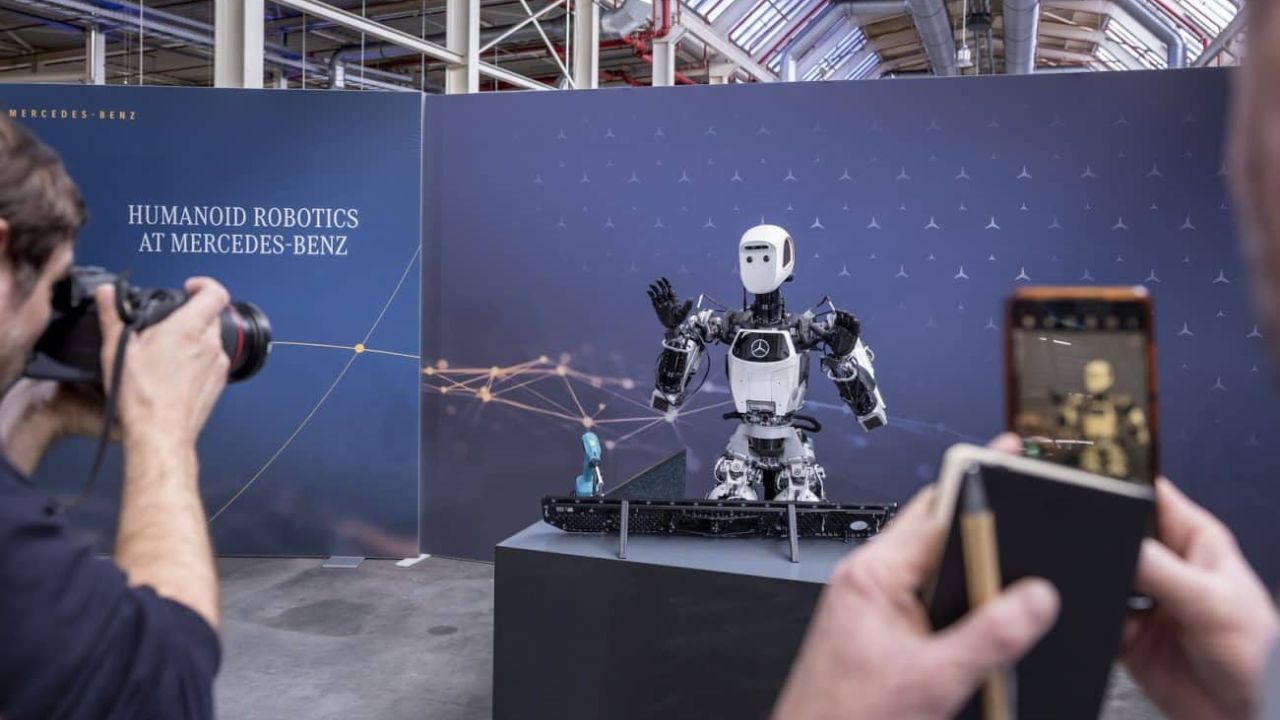Mercedes-Benz is bringing artificial intelligence (AI) and advanced robotics to its Berlin-Marienfelde facility, its oldest manufacturing plant, to enhance production efficiency. This move builds on the company’s commitment to digital transformation, which began in 2022 with the launch of its Digital Factory Campus. Now, the plant is leveraging AI-driven automation and humanoid robots to streamline operations while maintaining a strong focus on human expertise.
Apollo Humanoid Robots Take on Manual Tasks
The automaker has deployed Apollo humanoid robots, developed by Texas-based robotics firm Apptronik, to handle repetitive and physically demanding tasks such as transporting components within the factory. Additionally, these robots will assist in conducting initial quality-control checks on components. Mercedes-Benz emphasises that this initiative is designed to complement its highly skilled workforce rather than replace it, describing the programme as a “flexible, intelligent assistance system”.
Training Robots with AR and Human Expertise
To ensure efficiency, the company trained these robots using a combination of hands-on human guidance and augmented reality (AR) technology. Skilled workers controlled the robots during the learning phase, allowing them to perform precise tasks. This investment in robotic automation is part of a larger commitment to Apptronik, with Mercedes-Benz set to invest tens of millions of euros in the company. Notably, Apptronik has also partnered with Google to incorporate DeepMind’s cutting-edge robotics and AI technologies.
Click to read more on Mobility here: Convergence Now
AI-Powered Smart Assistants and Data Analysis
Beyond robotics, Mercedes-Benz is also introducing AI-powered assistants to support factory workers with everyday tasks. Employees can now use internal chatbots to access essential resources, including databases, manuals, and procedural guidelines. Additionally, AI-driven real-time data analysis is replacing labour-intensive human review processes. According to the company, these AI tools have already proven effective in identifying patterns and anomalies, helping to optimise production and address issues more efficiently.
A Future-Focused Strategy for Success
Katrin Lehmann, Chief Information Officer of Mercedes-Benz Group AG, highlights the positive impact of AI on workplace efficiency. “AI takes over the tasks we usually enjoy less, giving us time to focus on real innovation, creativity, and value-adding activities,” she stated. She believes that when implemented strategically, AI significantly contributes to business success.
Testing Next-Gen Vehicles with AI
Mercedes-Benz is already seeing tangible benefits from its AI-driven approach. The company tested aspects of its newly unveiled Mercedes-Benz CLA, the first model to feature the advanced Mercedes-Benz Operating System (MB.OS), using AI-enhanced production tools before launching full-scale factory production.
Advancing Toward an All-Electric Future
As part of its transition to becoming an all-electric car manufacturer, Mercedes-Benz is set to begin producing axial flux electric motors next year. These innovative motors require a complete redesign of traditional engine geometry, necessitating the development of new processes and manufacturing techniques. AI has played a pivotal role in creating and refining these advancements.
Through these technological innovations, Mercedes-Benz is reinforcing its leadership in the automotive industry, setting new benchmarks for efficiency, precision, and sustainability.




